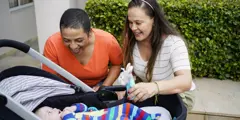Looking after a child in foster care is a complex and challenging role. Every child has a particular set of needs which have to be met by the foster carer, all with the aim of helping that child achieve their full potential.
Our website offers a range of advice and information about caring for a child. You can also seek advice from our team of friendly advisers on our advice lines


